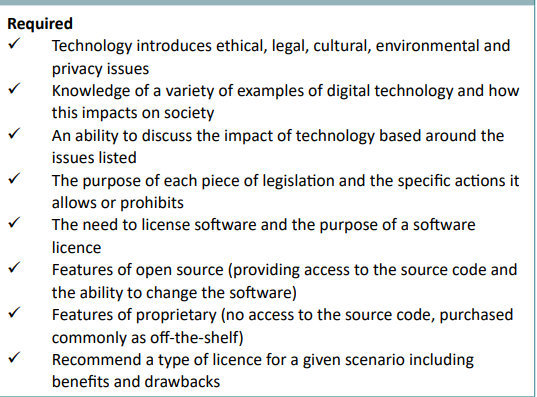< Back to all GCSE Cheat Sheets
Looking to ace your exams with easy-to-access, free 1:1 advice from exam survivors? Join the Baguette Brigaders Discord server, home to a friendly community of students, teachers and professionals who can answer any of your questions and give you valuable exam tips, tricks and insights!
Latest update: 23/09/2023 20:36
1.6 Impacts of digital technology
1.6.1 Ethical, legal, cultural and environmental impact
Here’s what the specification says on this subtopic:

Impacts of digital technology on wider society including:
- Ethical issues
- Legal issues
- Cultural issues
- Environmental issues
- Privacy issues
Ethical issues occur when a given decision, scenario or activity creates a conflict with a society’s moral principles.
A legal issue is something that happens that has legal implications and may need the help of a lawyer to sort out - a question or problem that is answered or resolved by the law.
Cultural issues are problems that occur when culture conflicts with systems, goals or other cultures. (e.g religion, ethnicity, generation)
Environmental issues are defined as harmful effects to Earth and its natural systems due to the actions of humans. (e.g pollution, animals dying, poisoning of environment, deforestation)
Privacy issues include companies using your personal data for their gain, e.g TikTok seeing what trends you’re into and giving you ads across other websites, which then track you and build up a profile of what you do online. To some people this would be creepy, especially as there’s no way to opt out
If in doubt, just say that’s what tiktok do because you’ll probably be right either way
Legislation relevant to Computer Science:
- The Data Protection Act 2018
- Controls how your personal information is used by companies, organisations or the Government.
- Computer Misuse Act 1990
- For securing computer material against unauthorised access or modification
- Copyright Designs and Patents Act 1988
- Gives the author or creator the right to copy, adapt, communicate, lend or sell copies of their work (can be sold or transferred)
- Software licences (i.e. open source and proprietary)
A software license agreement describes how the software should be used, and any restrictions it may have from the author, the provider and to end users.
Open source means providing access to the source code and the ability to change the software if you want. Groups of programmers often work together to provide support for users and develop the software further. These products are often tested by contributors in public. FREE TO USE, FOR ANYONE.
For example, BaguetteBot (Source Code + Invite Link) is free to use and inspect my code.
Proprietary means no access to the source code (already compiled), purchased commonly as ‘off-the-shelf’ for example games. Also known as closed-source. It remains the legal property of whoever made it. Source code is usually not released, and may require a license key to use it in return for money.
Developers of proprietary products are expected to create tutorials and support many operating systems themselves, especially if the product costs money.
In short, if you want to make money, use a proprietary license. If you want people to improve your code and find bugs, use an open source license. You will need to recommend a type of licence for a given scenario, including benefits and drawbacks.
This is an snippet from our complete GCSE Computer Science Cheat Sheet.
For the full version, including comprehensive coverage of both Paper 1 and Paper 2, along with coding practice examples, visit https://ibaguette.com/cheatsheets/gcse and select “Computer Science: Paper 1 and 2.”
Feel free to share these revision resources with friends, family, and teachers!
Created with 💕 by Draggie